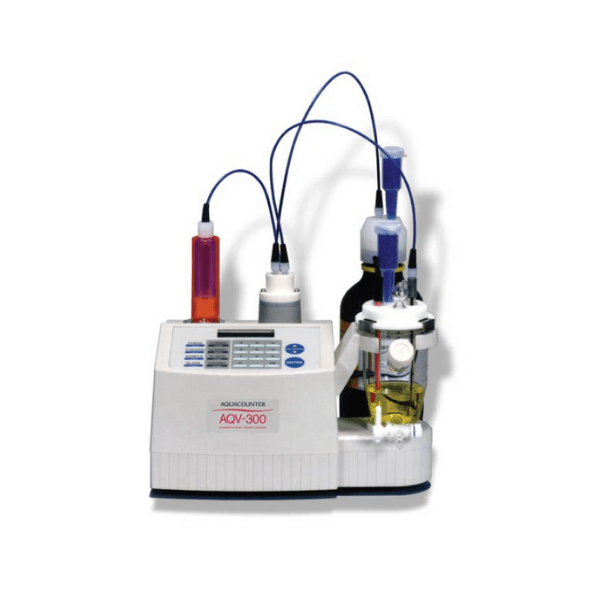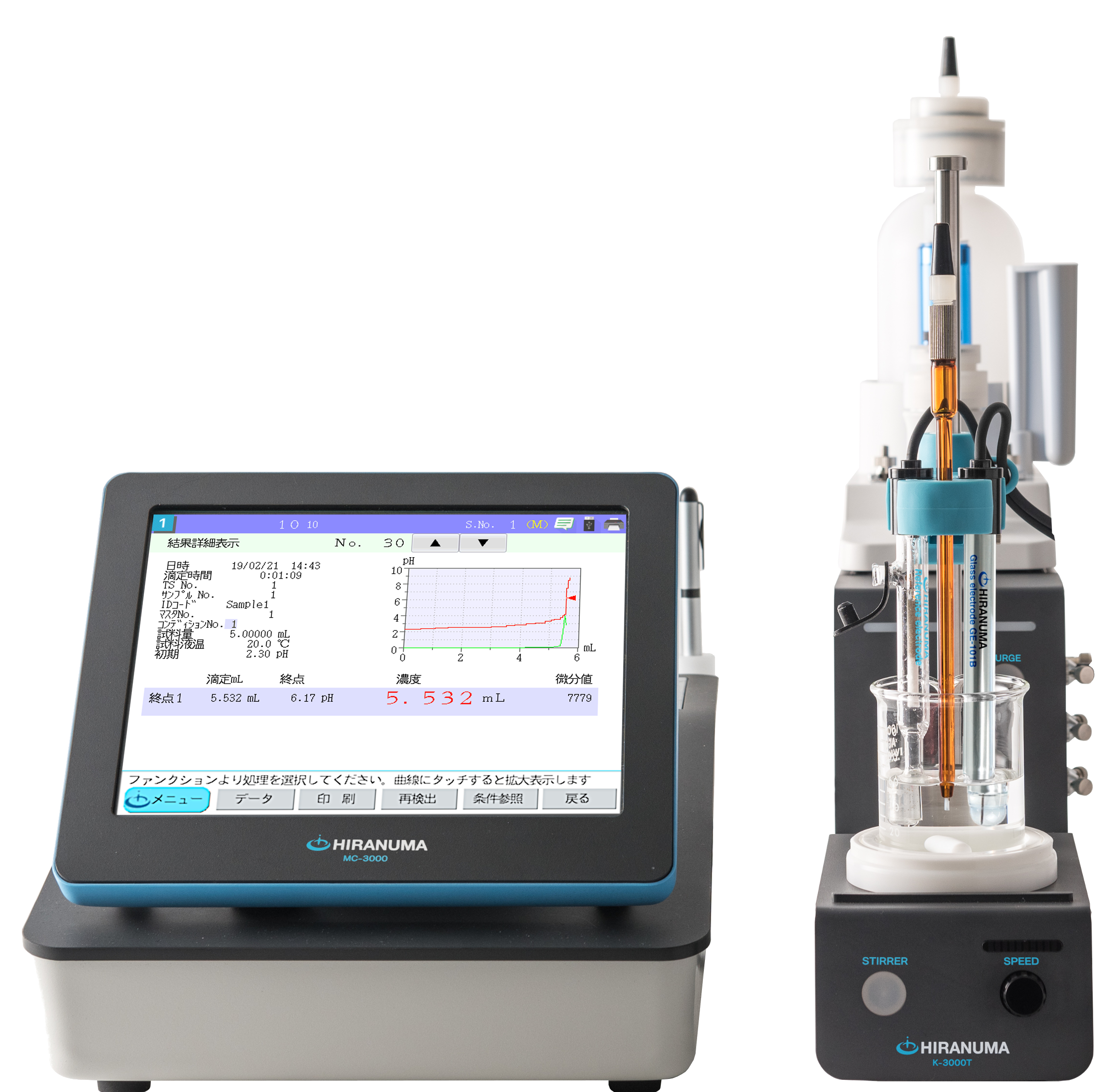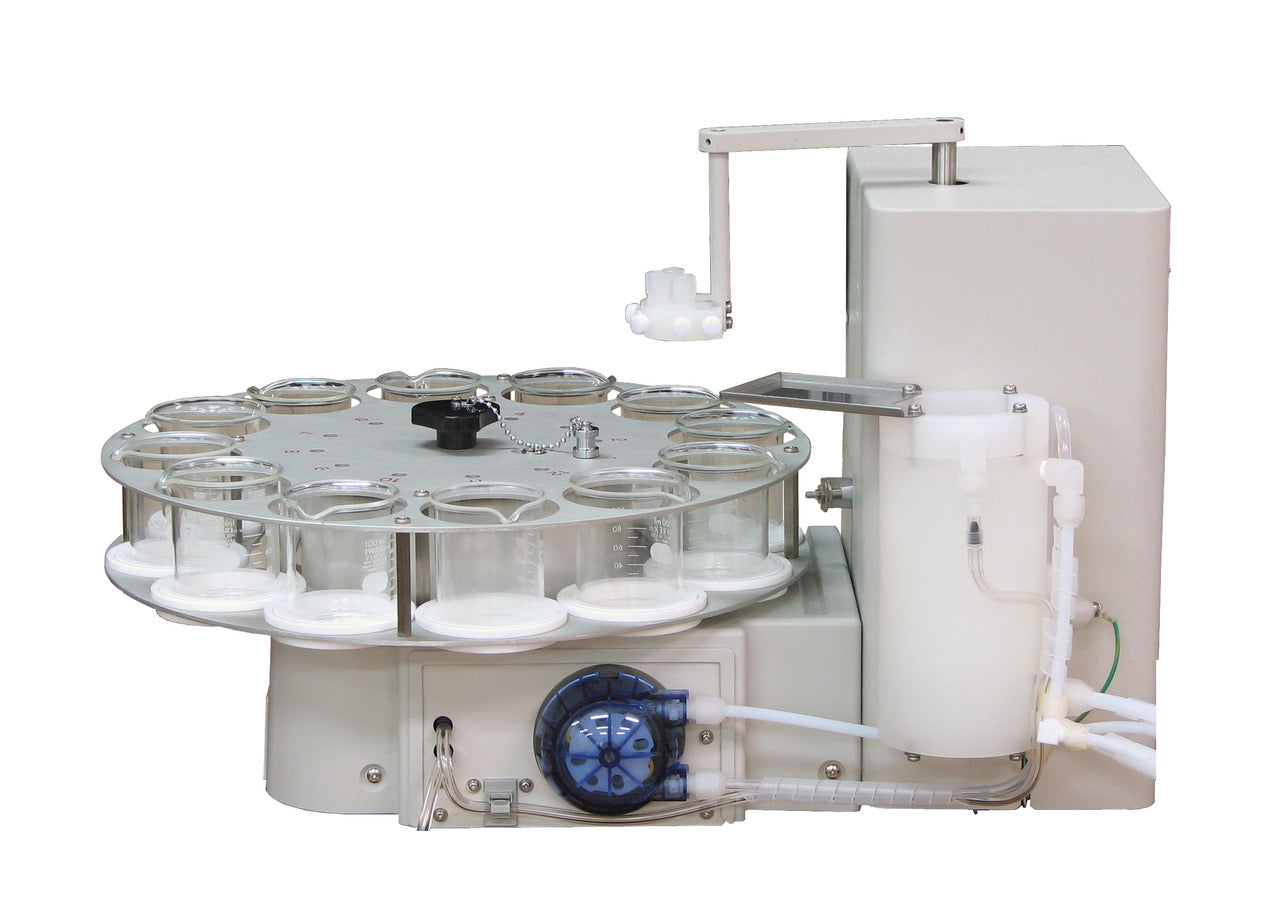Karl Fischer & Potentiometric Titration Application Library
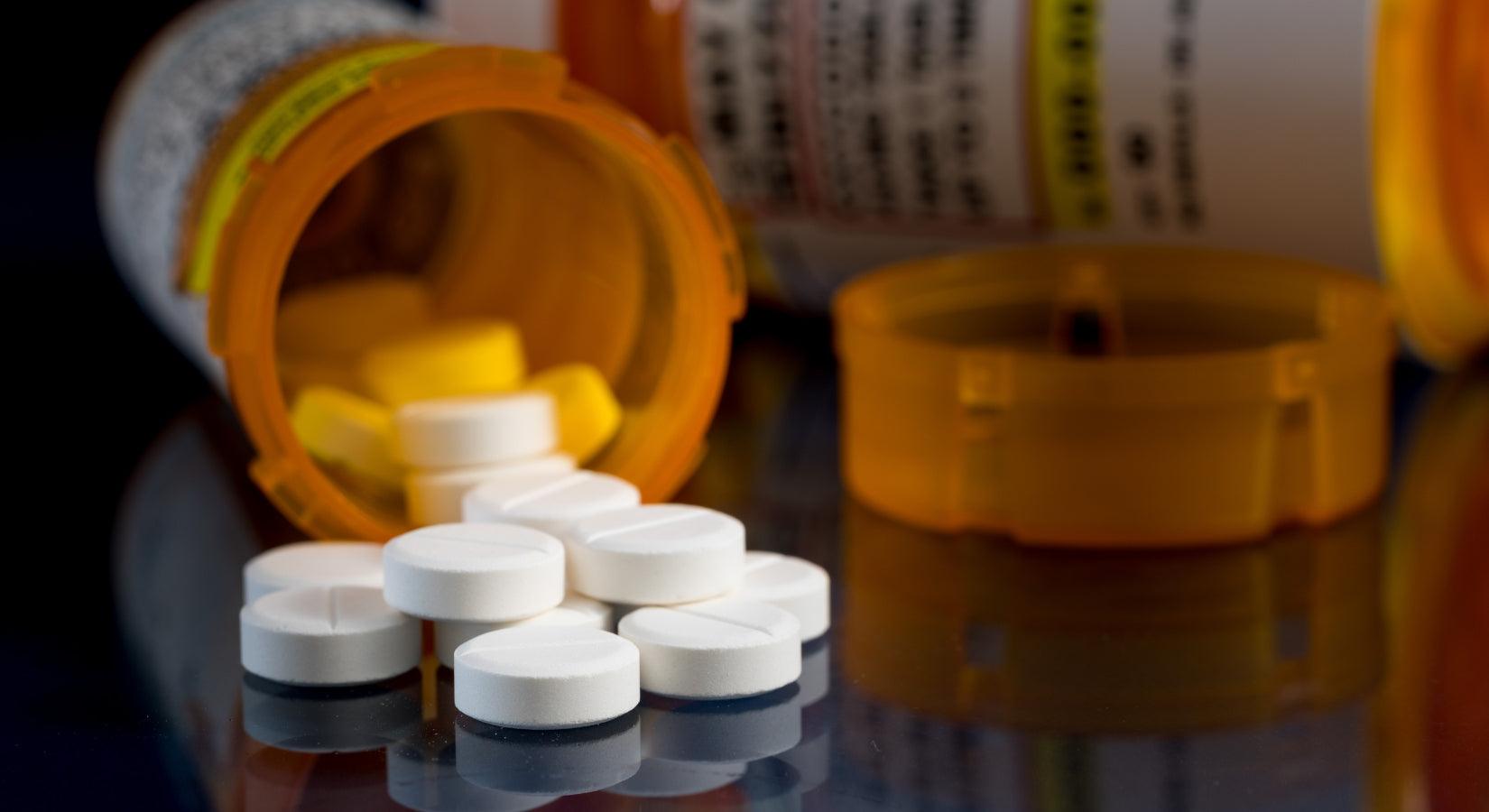
Drugs and Medicines – KF Volumetry, Back-Titration, Japanese Pharmacopoeia – Suitability test | Karl Fischer titrator AQV-300/MOIVO-A19
Water contents of drugs and medicines could be determined by Karl Fischer volumetric titrator. In volumetric titration, the titrant have a factor which means the ability to react with how many milligrams of water per 1 mL of titrant. Factor is pre-determined before sample measurement and water content of sample is calculated from consumed titrant volume within sample measurement.
There are two methods in KF volumetric titration, forward-titration and back-titration. Forward-titration is used in general. However, some of the sample should be measured by back-titration method according to Pharmacopeias.
In this report, the suitability test of Japanese Pharmacopoeia Eighteenth Edition was performed for dextromethorphan hydrobromide monohydrate, also introduced in Application Data No. 11, with back-titration method. Please refer to Application Data No. 11 for the factor determination of titrants procedure and the repeatability of measurement results for dextromethorphan hydrobromide monohydrate.
There are two methods in KF volumetric titration, forward-titration and back-titration. Forward-titration is used in general. However, some of the sample should be measured by back-titration method according to Pharmacopeias.
In this report, the suitability test of Japanese Pharmacopoeia Eighteenth Edition was performed for dextromethorphan hydrobromide monohydrate, also introduced in Application Data No. 11, with back-titration method. Please refer to Application Data No. 11 for the factor determination of titrants procedure and the repeatability of measurement results for dextromethorphan hydrobromide monohydrate.
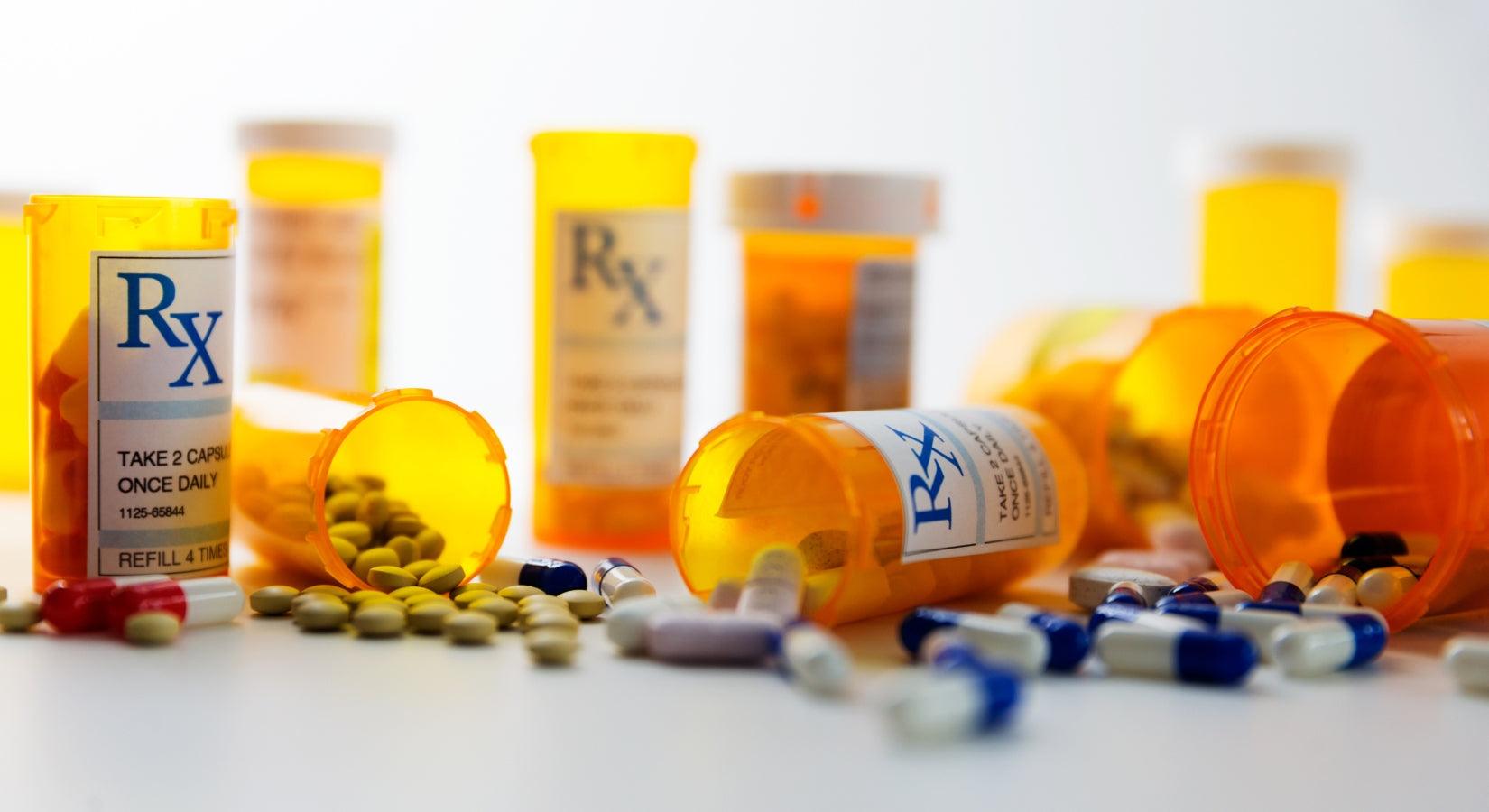
Drugs and Medicines – KF Coulometry, Japanese Pharmacopoeia – Suitability test | Karl Fischer titrator AQ-300/MOICO-A19
Water contents of drugs and medicines could be determined by Karl Fischer coulometric titrator. In coulometric titration, iodine of Karl Fischer reagent is generated by electrolysis and generated iodine quantitatively reacts with water.
In the method of “Water determination (Karl Fischer method)” in Japanese Pharmacopoeia Eighteenth Edition, the suitability test is described as a verification procedure when modifying the test procedures. As premises for complying the suitability test, it is possible to select and use the appropriate KF reagent from commercially available products.
In this report, the suitability test of Japanese Pharmacopoeia Eighteenth Edition was performed for thiamine chloride hydrochloride, also introduced in Application Data No. 9, with coulometric titration method. Please refer to Application Data No. 9 for the detail of sample addition procedure and the repeatability of measurement results for thiamine chloride hydrochloride.
In the method of “Water determination (Karl Fischer method)” in Japanese Pharmacopoeia Eighteenth Edition, the suitability test is described as a verification procedure when modifying the test procedures. As premises for complying the suitability test, it is possible to select and use the appropriate KF reagent from commercially available products.
In this report, the suitability test of Japanese Pharmacopoeia Eighteenth Edition was performed for thiamine chloride hydrochloride, also introduced in Application Data No. 9, with coulometric titration method. Please refer to Application Data No. 9 for the detail of sample addition procedure and the repeatability of measurement results for thiamine chloride hydrochloride.

Drugs and Medicines – KF Volumetry, Japanese Pharmacopoeia – Suitability test | Karl Fischer titrator AQV-300/MOIVO-A19
Water contents of drugs and medicines could be determined by Karl Fischer volumetric titrator. In volumetric titration, the titrant have a factor which means the ability to react with how many milligrams of water per 1 mL of titrant. Factor is pre-determined before sample measurement and water content of sample is calculated from consumed titrant volume within sample measurement.
In the method of “Water determination (Karl Fischer method)” in Japanese Pharmacopoeia Eighteenth Edition, the suitability test is described as a verification procedure when modifying the test procedures. In this report, a case example of suitability test is introduced with using glycerin as a simulated measurement sample.
In the method of “Water determination (Karl Fischer method)” in Japanese Pharmacopoeia Eighteenth Edition, the suitability test is described as a verification procedure when modifying the test procedures. In this report, a case example of suitability test is introduced with using glycerin as a simulated measurement sample.
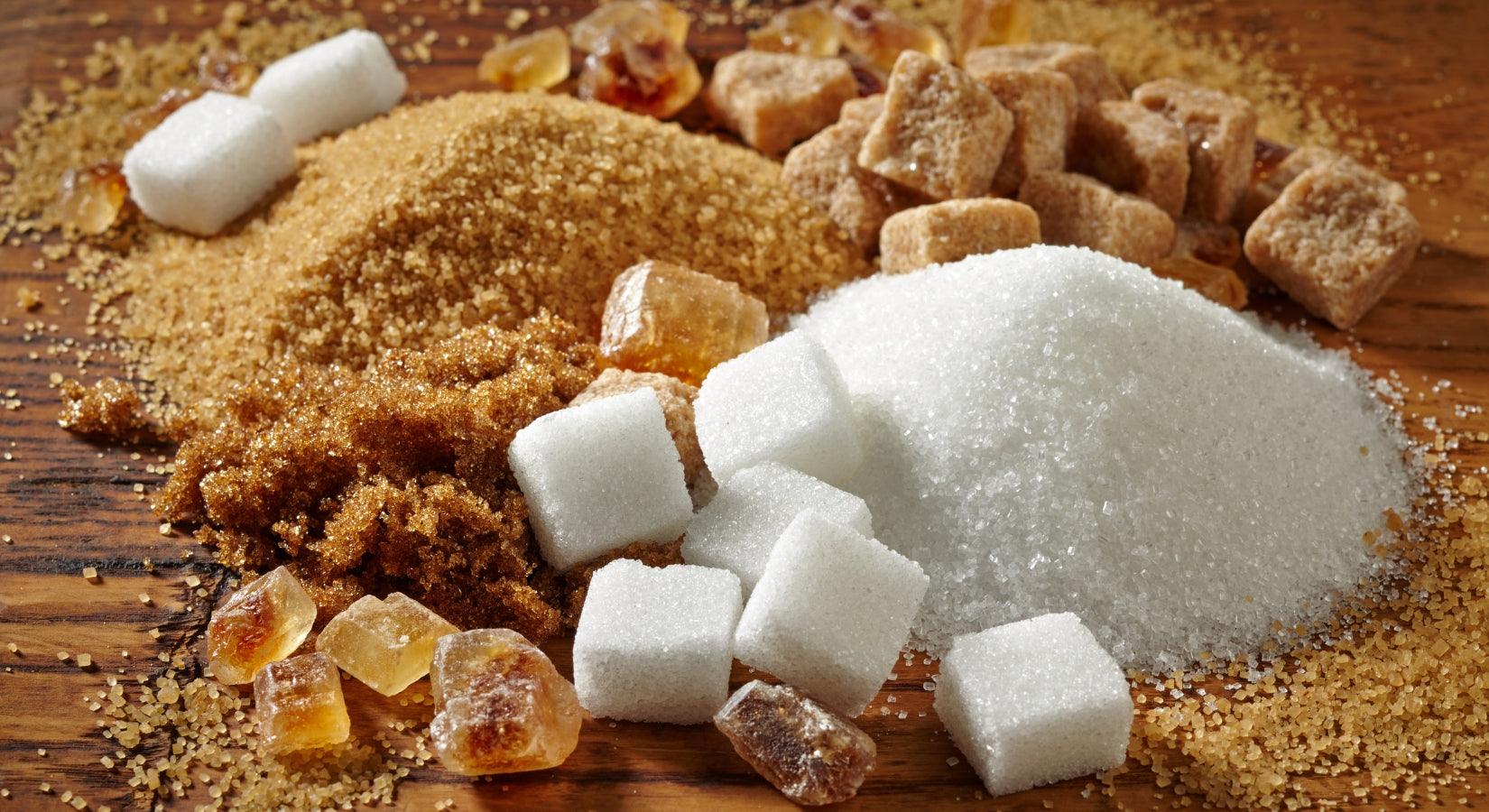
Sugars – KF Volumetry, granulated sugar Factor standardization with water standard | Karl Fischer titrator AQV-300/MOIVO-A19
Water contents of granulated sugar could be determined by Karl Fischer volumetric titrator. In volumetric titration, titrant have a factor which means the amount to react with water per 1 mL of titrant. The factor is pre-determined before sample measurement and water content of sample is calculated from the consumed titrant volume by sample measurement.
This application introduces an example for the water determination in granulated sugar. Due to the low water content of this sample, a relatively large amount of sample must be added, but the solubility in methanol as titration solvent is not sufficient. Sugars have tendency to dissolve in formamide. Therefore a mixed solvent of formamide and methanol was chosen as the titration solvent. To make it easier to dissolve the sample, the titration cell was heated to 45 °C using an outer chamber for flowing warm water.
Since the water content of the granulated sugar is often a few hundred ppm, the titrant with low factor value, as 1 mg/mL was used. When pure water is used as the standard material of factor standardization for low factor titrant, the amount of pure water added should be as small as 10 to 20 mg, which makes accurate addition and weighing difficult. Therefore, water standard material which is the solution containing 1 % of water sealed in glass ampoule is used for the factor standardization.
This application introduces an example for the water determination in granulated sugar. Due to the low water content of this sample, a relatively large amount of sample must be added, but the solubility in methanol as titration solvent is not sufficient. Sugars have tendency to dissolve in formamide. Therefore a mixed solvent of formamide and methanol was chosen as the titration solvent. To make it easier to dissolve the sample, the titration cell was heated to 45 °C using an outer chamber for flowing warm water.
Since the water content of the granulated sugar is often a few hundred ppm, the titrant with low factor value, as 1 mg/mL was used. When pure water is used as the standard material of factor standardization for low factor titrant, the amount of pure water added should be as small as 10 to 20 mg, which makes accurate addition and weighing difficult. Therefore, water standard material which is the solution containing 1 % of water sealed in glass ampoule is used for the factor standardization.
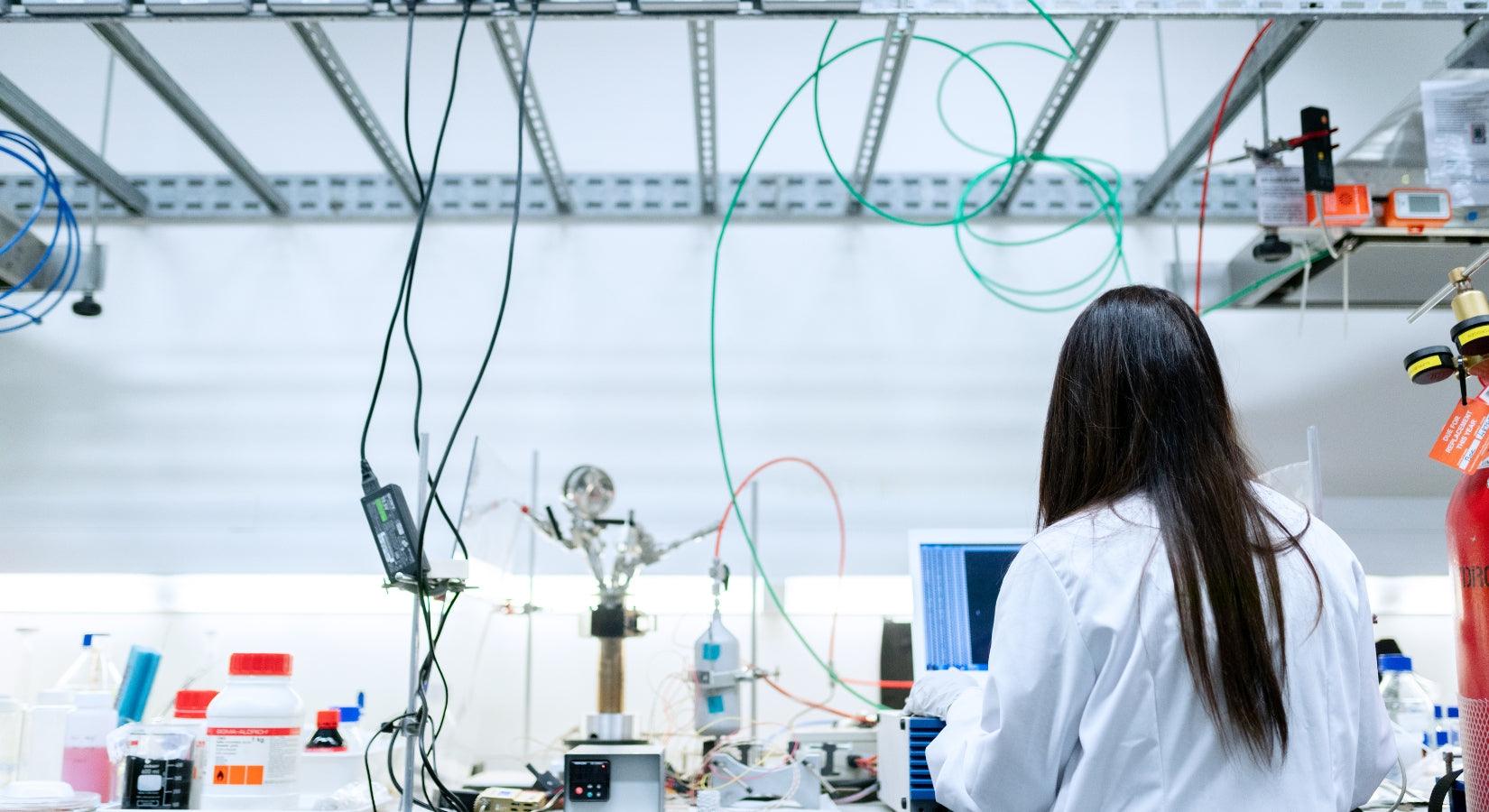
Validation test with water standard KF Coulometry – Heat evaporation method | Karl Fischer titrator AQ-300/MOICO-A19/EV-2000
A heat evaporation method using Karl Fischer titrator combined with solid evaporator is suitable for insoluble sample in anode solution, such as plastics and inorganic compounds. The measurement of with the heat evaporation method is carried out by heating the sample while a carrier gas is blown into the evaporation chamber and introducing the evaporated moisture together with the carrier gas into the electrolysis cell.
This application introduces an example of measurement of solid water standard for validation of titrator system with solid evaporator.
This application introduces an example of measurement of solid water standard for validation of titrator system with solid evaporator.
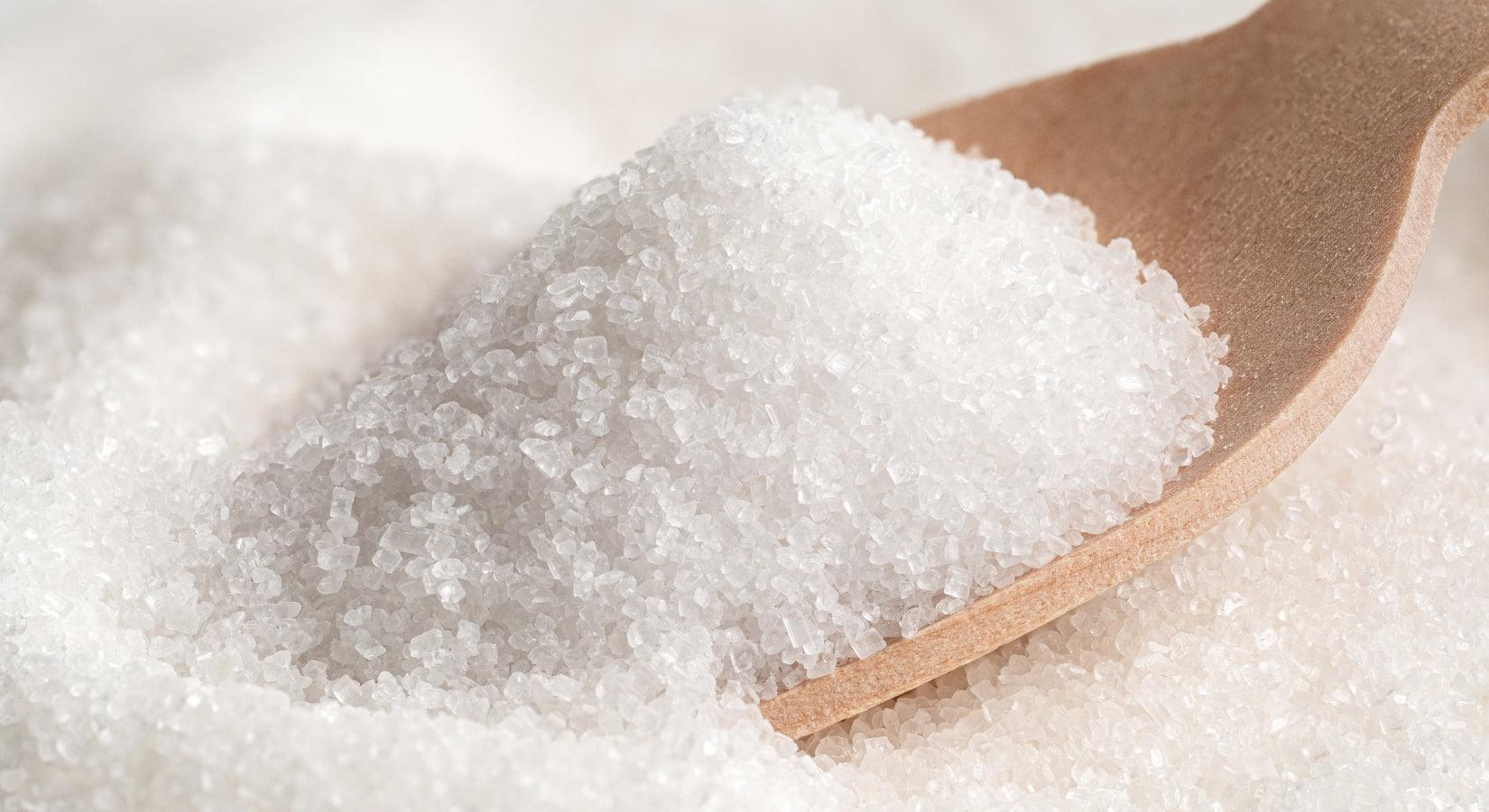
Sugars – KF Volumetry, Powder Sample Glucose, fructose, and sucrose | Karl Fischer titrator AQV-300/MOIVO-A19
Water contents of sugars could be determined by Karl Fischer volumetric titrator. In volumetric titration, titrant have a factor which means the capacity to react with water per 1 mL of titrant. Factor is pre-determined before sample measurement and water content of sample is calculated from consumed titrant volume by sample measurement.
This application introduces an example for the water determination in glucose, fructose, and sucrose. Sugars have tendency to dissolve in formamide. Therefore a mixed solvent of formamide and methanol was chosen as the titration solvent.
This application introduces an example for the water determination in glucose, fructose, and sucrose. Sugars have tendency to dissolve in formamide. Therefore a mixed solvent of formamide and methanol was chosen as the titration solvent.
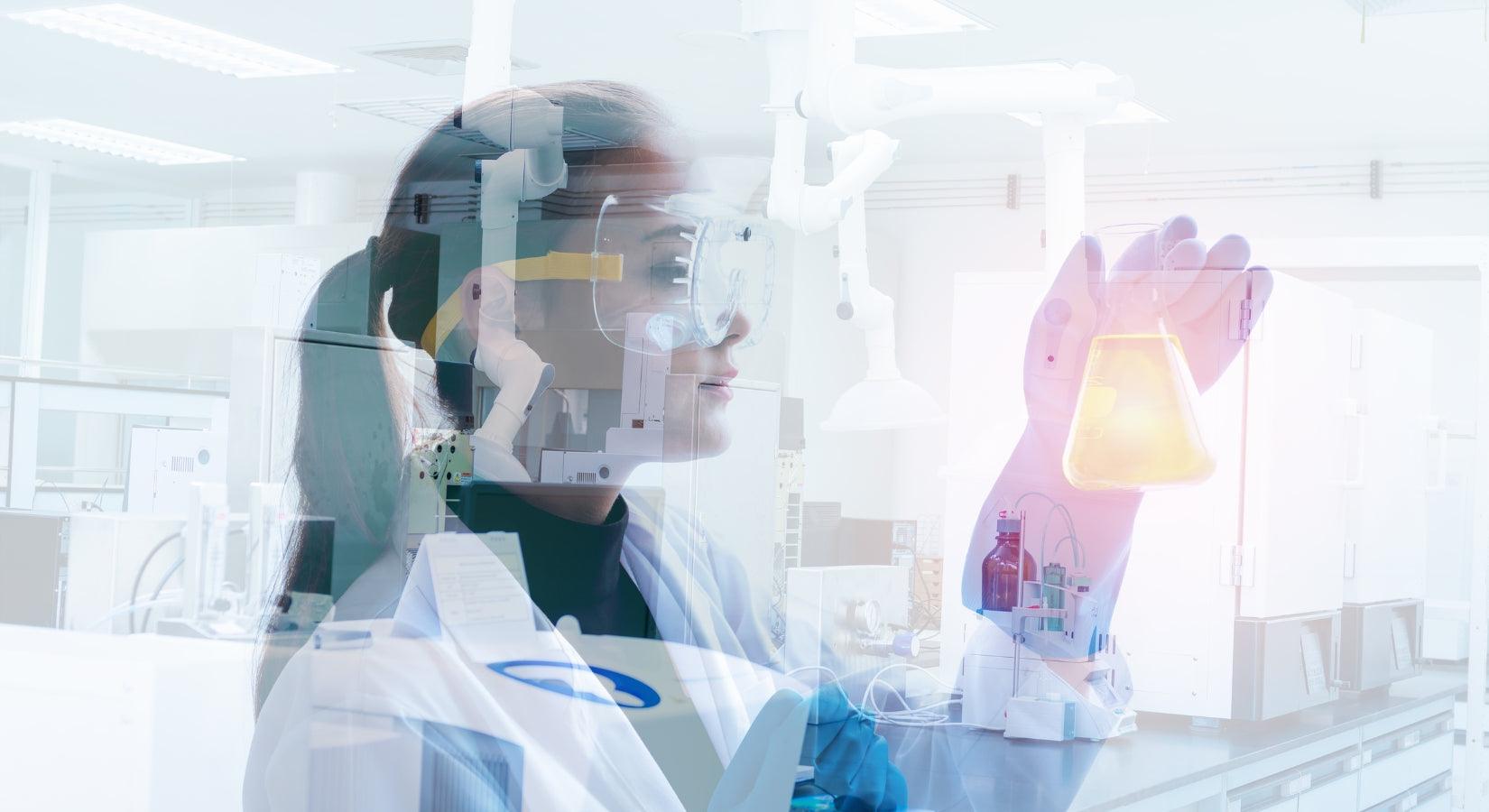
Ketones, Cyclohexanone – KF Coulometry, Cooled direct injection, Azeotropic distillation | Karl Fischer titrator AQ-300/MOICO-A19/EV-2000L
Water content of cyclohexanone is determined by Karl Fischer coulometric titrator. In coulometric titration, iodine of Karl Fischer reagent is generated by electrolysis and generated iodine quantitatively reacts with water. Reaction formula is described below.
H₂O + I₂ + SO₂ + 3RN + CH₃OH → 2RN・HI + RN・HSO₄CH₃
2RN・HI → I₂ + 2RN + 2H⁺ + 2e⁻
Ketones and aldehydes would interfere the Karl Fischer reaction by side-reaction with methanol (formula (1)).
R₂CO + 2CH₃OH → R₂C(OCH₃)₂ + H₂O ・・・(1)
Therefore it is necessary to use methanol-free anode and cathode solution. There are commercially available reagents with a special composition for ketones and aldehydes. However, cyclohexanone has particularly a strong side reaction activity, so it is difficult to measure by direct injection method at room temperature. In the measurement of cyclohexanone, it is effective to lower the activity of side reaction by cooling or to separate cyclohexanone and water by distillation.
This application introduces an example for the water determination in cyclohexanone with cooled direct injection method and azeotropic distillation method
H₂O + I₂ + SO₂ + 3RN + CH₃OH → 2RN・HI + RN・HSO₄CH₃
2RN・HI → I₂ + 2RN + 2H⁺ + 2e⁻
Ketones and aldehydes would interfere the Karl Fischer reaction by side-reaction with methanol (formula (1)).
R₂CO + 2CH₃OH → R₂C(OCH₃)₂ + H₂O ・・・(1)
Therefore it is necessary to use methanol-free anode and cathode solution. There are commercially available reagents with a special composition for ketones and aldehydes. However, cyclohexanone has particularly a strong side reaction activity, so it is difficult to measure by direct injection method at room temperature. In the measurement of cyclohexanone, it is effective to lower the activity of side reaction by cooling or to separate cyclohexanone and water by distillation.
This application introduces an example for the water determination in cyclohexanone with cooled direct injection method and azeotropic distillation method
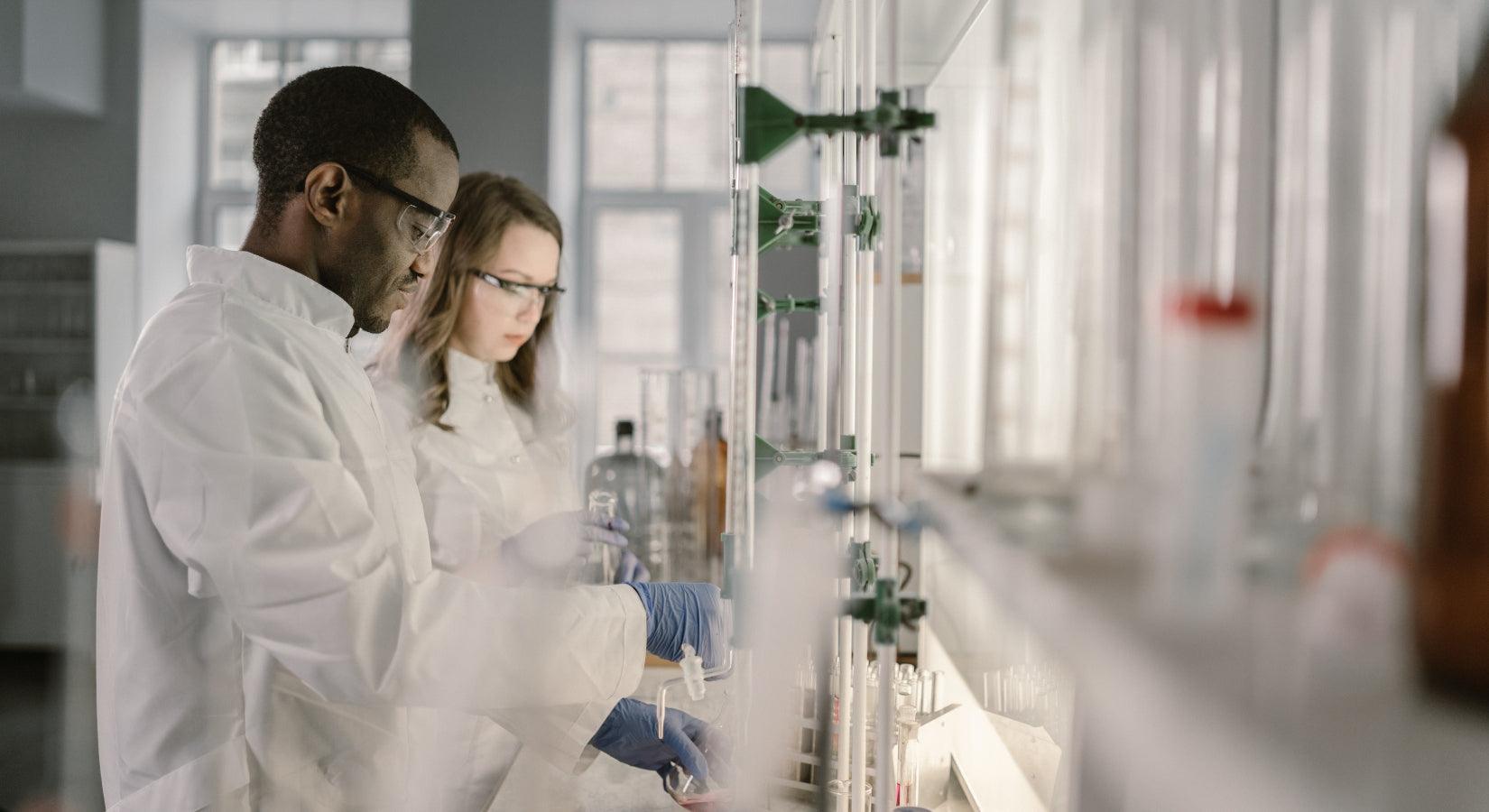
Ketones – KF Coulometry, Direct-Injection Methyl ethyl ketone and Acetone | Karl Fischer titrator AQ-300/MOICO-A19
Water content of ketones could be determined by Karl Fischer coulometric titrator. In coulometric titration, iodine of Karl Fischer reagent is generated by electrolysis and generated iodine quantitatively reacts with water. Reaction formula is described below.
H₂O + I₂ + SO₂ + 3RN + CH₃OH → 2RN・HI + RN・HSO₄CH₃
2RN・HI → I₂ + 2RN + 2H⁺ + 2e⁻
When the sample is liquid, generally sample is measured by direct injection into the titration cell. Anode solution containing methanol as solvent is generally used for various sample. However, in the measurement of ketones and aldehydes, since these react with methanol to produce water, the measurement result tends to be higher than the true value (formula (1)).
R₂CO + 2CH₃OH → R₂C(OCH₃)₂ + H₂O ・・・(1)
For above reason, Karl Fischer reagent without methanol should be used for water determination of ketones and aldehydes. There are commercially available reagents with a special composition for ketones and aldehydes. This chapter introduces an example for the water determination in methyl ethyl ketone and acetone. These samples are often used as paint solvents, raw materials of adhesives, and synthetic resins.
H₂O + I₂ + SO₂ + 3RN + CH₃OH → 2RN・HI + RN・HSO₄CH₃
2RN・HI → I₂ + 2RN + 2H⁺ + 2e⁻
When the sample is liquid, generally sample is measured by direct injection into the titration cell. Anode solution containing methanol as solvent is generally used for various sample. However, in the measurement of ketones and aldehydes, since these react with methanol to produce water, the measurement result tends to be higher than the true value (formula (1)).
R₂CO + 2CH₃OH → R₂C(OCH₃)₂ + H₂O ・・・(1)
For above reason, Karl Fischer reagent without methanol should be used for water determination of ketones and aldehydes. There are commercially available reagents with a special composition for ketones and aldehydes. This chapter introduces an example for the water determination in methyl ethyl ketone and acetone. These samples are often used as paint solvents, raw materials of adhesives, and synthetic resins.
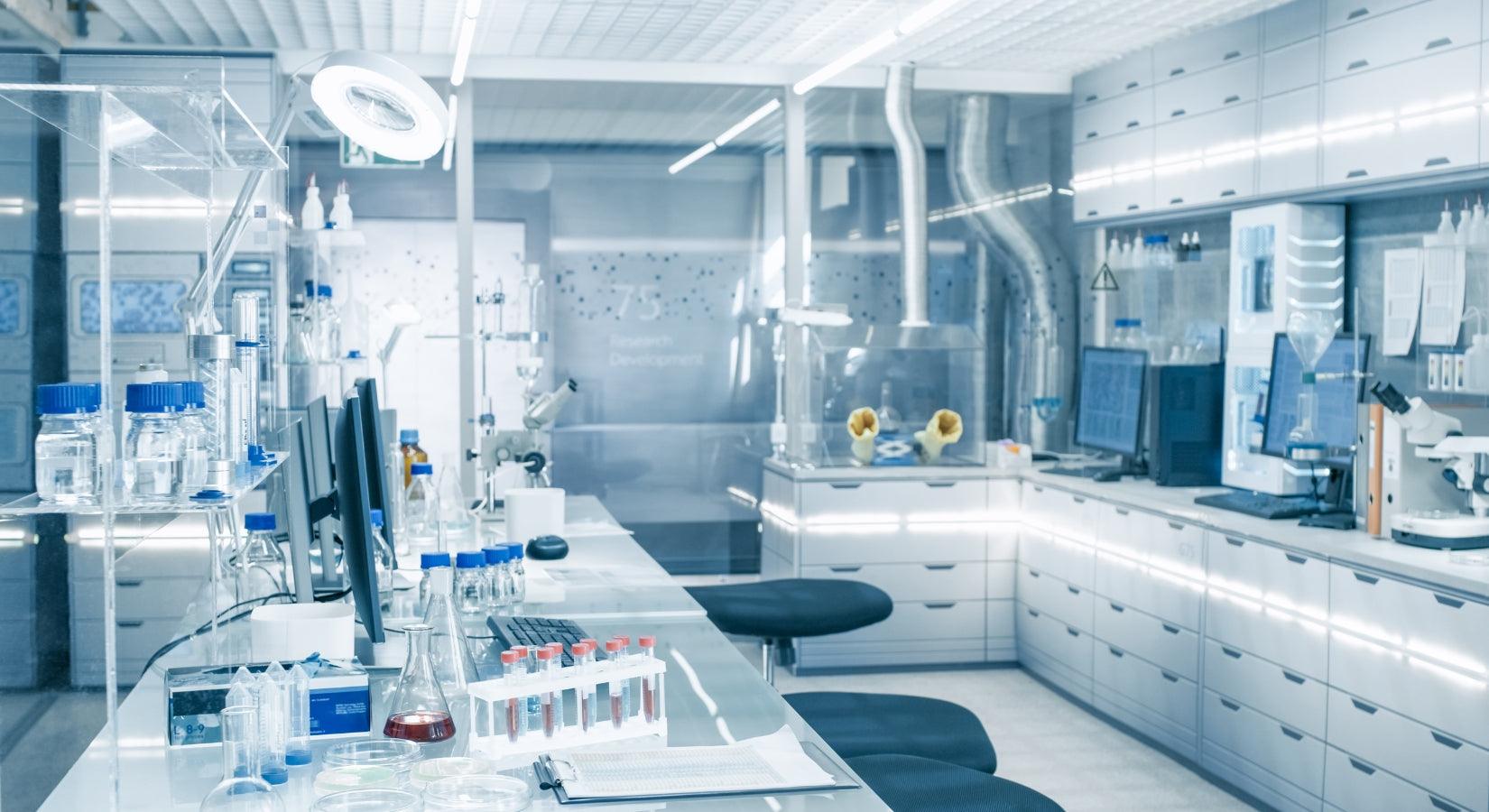
Ketones and Aldehydes – KF Volumetry, Direct-Injection Methyl ethyl ketone, Acetone, and Cyclohexanone | Karl Fischer titrator AQV-300/MOIVO-A19
Water contents of ketones and aldehydes could be determined by Karl Fischer volumetric titrator. In volumetric titration, titrant have a factor which is the capacity to react with water per 1 mL of titrant. Factor is pre-determined before sample measurement and water content of sample is calculated from consumed titrant volume by sample measurement.
When the sample is liquid, generally sample is measured by direct injection into the titration cell. Dehydrated methanol is generally used for titration solvent. However, in the measurement of ketones and aldehydes, since these react with methanol to produce water, the measurement result tends to be higher than the true value (formula (1)).
R₂CO + 2CH₃OH → R₂C(OCH₃)₂ + H₂O ・・・(1)
For above reason, Karl Fischer reagent without methanol should be used for water determination of ketones and aldehydes. There are commercially available reagents with a special composition for ketones and aldehydes. This chapter introduces an example for the water determination in methyl ethyl ketone, acetone and cyclohexanone with water added to them to 1 %. These samples are often used as paint solvents, raw materials of adhesives, and synthetic resins.
When the sample is liquid, generally sample is measured by direct injection into the titration cell. Dehydrated methanol is generally used for titration solvent. However, in the measurement of ketones and aldehydes, since these react with methanol to produce water, the measurement result tends to be higher than the true value (formula (1)).
R₂CO + 2CH₃OH → R₂C(OCH₃)₂ + H₂O ・・・(1)
For above reason, Karl Fischer reagent without methanol should be used for water determination of ketones and aldehydes. There are commercially available reagents with a special composition for ketones and aldehydes. This chapter introduces an example for the water determination in methyl ethyl ketone, acetone and cyclohexanone with water added to them to 1 %. These samples are often used as paint solvents, raw materials of adhesives, and synthetic resins.
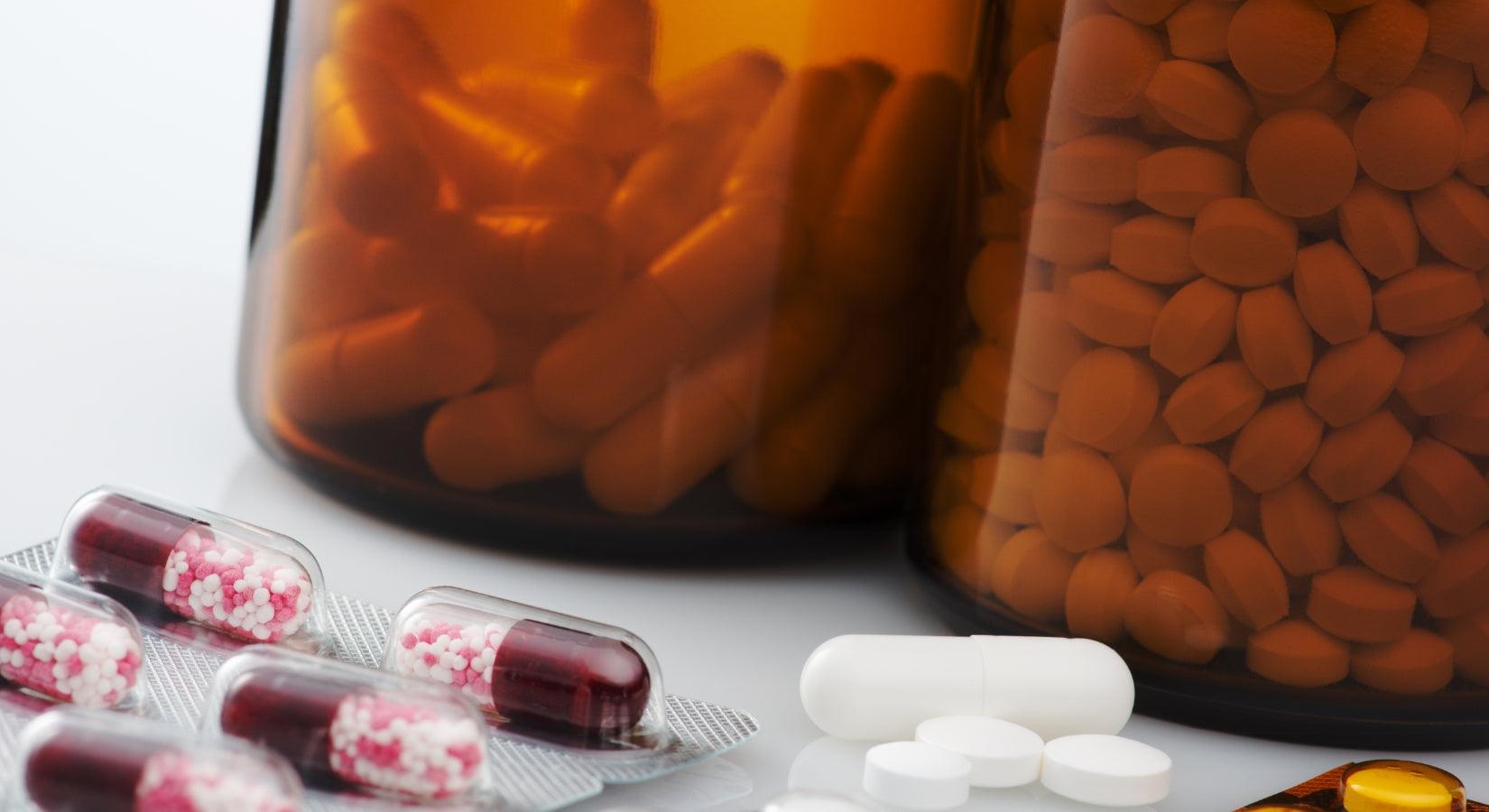
Drugs and Medicines – KF Volumetry, Powder Sample Lactose hydrate and L-Histidine hydrochloride hydrate | Karl Fischer titrator AQV-300/MOIVO-A19
Water contents of drugs and medicines are usually determined by Karl Fischer volumetric titrator. In volumetric titration, titrant have a factor which means the capacity to react with water per 1 mL of titrant. Factor is pre-determined before sample measurement and water content of sample is calculated from consumed titrant volume within sample measurement.
This application introduces an example for the water determination in lactose hydrate and L-histidine hydrochloride hydrate with reference to Japanese Pharmacopeia. Sample is measured by direct injection into the cell. When the solubility of the sample in methanol is not sufficient, use a mixed solvent of methanol and formamide as the titration solvent.
Reference
1) Japanese Pharmacopoeia Seventeenth Edition
This application introduces an example for the water determination in lactose hydrate and L-histidine hydrochloride hydrate with reference to Japanese Pharmacopeia. Sample is measured by direct injection into the cell. When the solubility of the sample in methanol is not sufficient, use a mixed solvent of methanol and formamide as the titration solvent.
Reference
1) Japanese Pharmacopoeia Seventeenth Edition
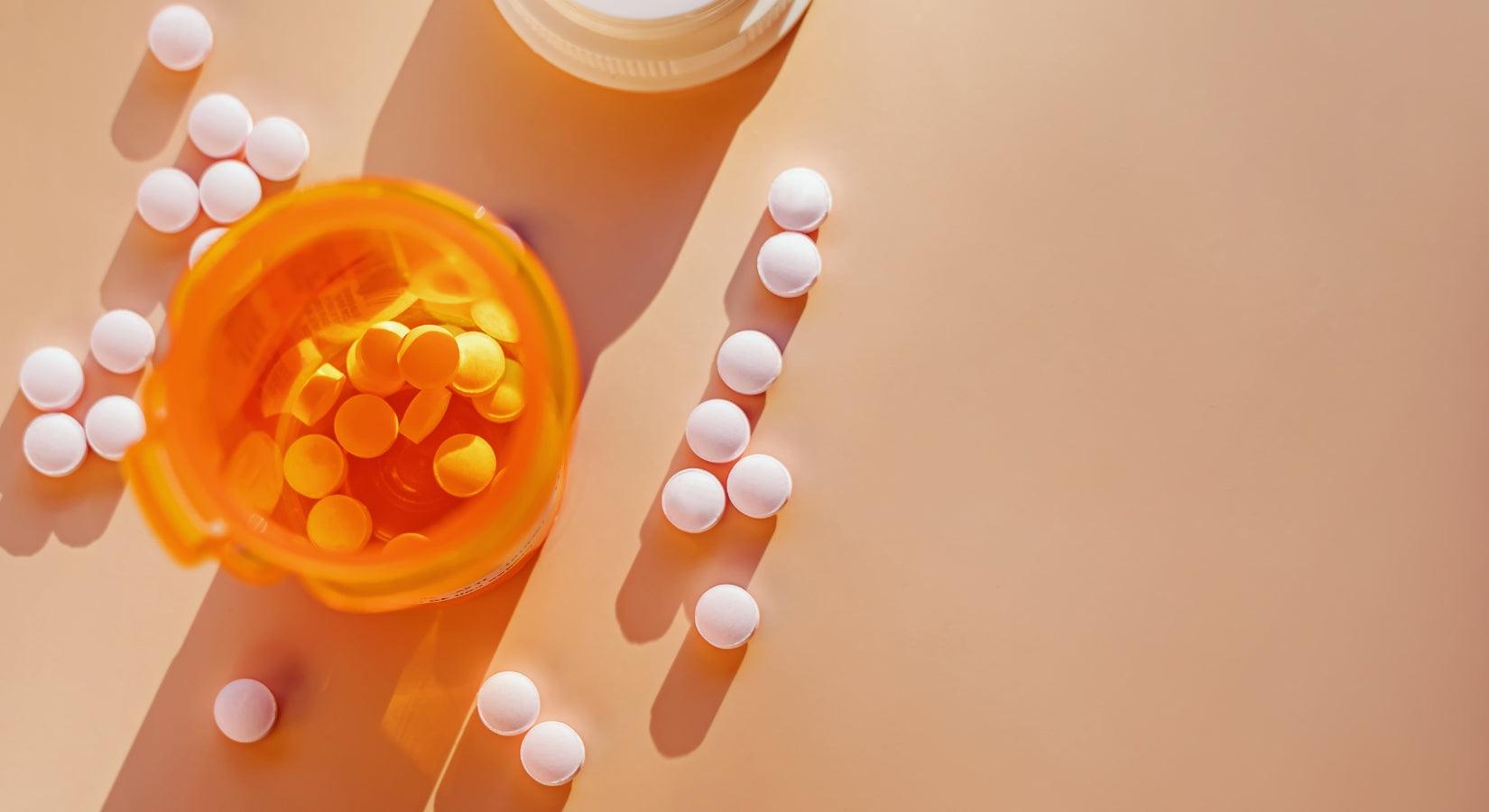
Drugs and Medicines – KF Volumetry, Powder Sample Sodium Lauryl Sulfate and Benzalkonium Chloride | Karl Fischer titrator AQV-300/MOIVO-A19
Water contents of drugs and medicines could be determined by Karl Fischer volumetric titrator. In volumetric titration, titrant have a titer which means the capacity to react with water per 1 mL of titrant. Factor is pre-determined before sample measurement and water content of sample is calculated from consumed titrant volume within sample measurement.
When the sample is solid, firstly sample is measured by direct injection into the cell. Dehydrated methanol is used for titration solvent. The titration solvent may change to a composition suitable for dissolving the sample. If the sample is insoluble to titration solvent, heat-evaporation method is appropriate to these samples. An example for water contents measurements of sodium lauryl sulfate and benzalkonium chloride performed by direct injection method are introduced here. The measurement method was determined with reference to Japanese Pharmacopeia.
Reference
1) Japanese Pharmacopoeia Seventeenth Edition
When the sample is solid, firstly sample is measured by direct injection into the cell. Dehydrated methanol is used for titration solvent. The titration solvent may change to a composition suitable for dissolving the sample. If the sample is insoluble to titration solvent, heat-evaporation method is appropriate to these samples. An example for water contents measurements of sodium lauryl sulfate and benzalkonium chloride performed by direct injection method are introduced here. The measurement method was determined with reference to Japanese Pharmacopeia.
Reference
1) Japanese Pharmacopoeia Seventeenth Edition
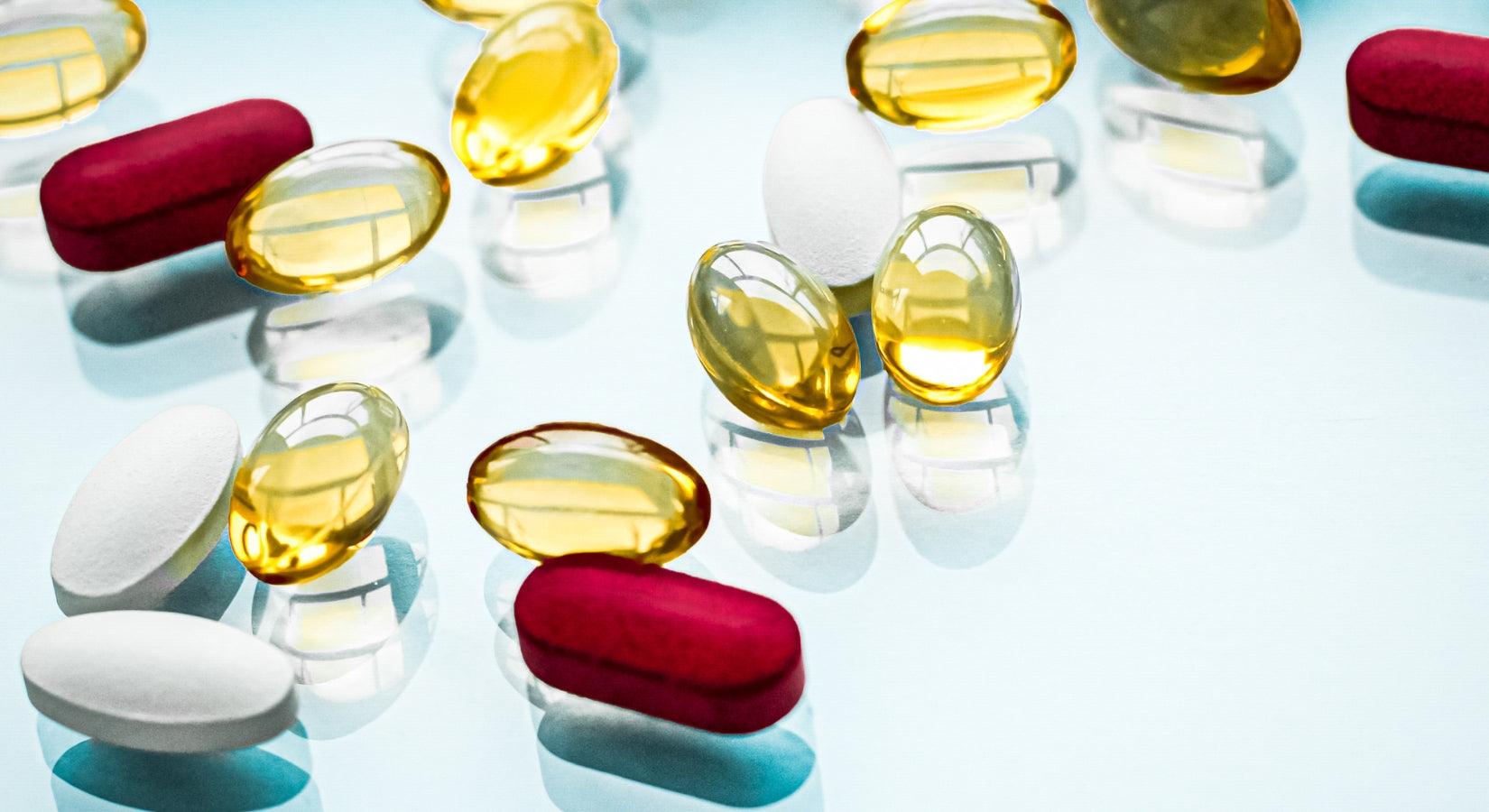
Drugs and Medicines – KF Volumetry, Back-Titration, Dextromethorphan Hydrobromide Monohydrate | Karl Fischer titrator AQV-300/MOIVO-A19
Water contents of drugs and medicines could be determined by Karl Fischer volumetric titrator. In volumetric titration, the titrant have a factor which means the ability to react with how many milligrams of water per 1 mL of titrant. Factor is pre-determined before sample measurement and water content of sample is calculated from consumed titrant volume within sample measurement.
There are two methods in KF volumetric titration, forward-titration and back-titration. Forward-titration is used in general. However, some of the sample should be measured by back-titration method according to Pharmacopeias. In back-titration method, firstly excess amount of KF titrant is added to the water contained in the sample, and then the remaining unreacted of KF titrant is titrated with water-in-methanol solution. Therefore, it is necessary to measure the factor not only KF titrant but also the water-in-methanol before the sample measurement.
An example for water contents measurements of dextromethorphan hydrobromide monohydrate performed by back-titration method is introduced here. The measurement method was determined with the reference to Japanese Pharmacopeia. Please refer to Application Data No. 22 for the suitability test of Japanese Pharmacopoeia eighteenth edition by the back titration method.
Reference
1) Japanese Pharmacopoeia Eighteenth Edition
There are two methods in KF volumetric titration, forward-titration and back-titration. Forward-titration is used in general. However, some of the sample should be measured by back-titration method according to Pharmacopeias. In back-titration method, firstly excess amount of KF titrant is added to the water contained in the sample, and then the remaining unreacted of KF titrant is titrated with water-in-methanol solution. Therefore, it is necessary to measure the factor not only KF titrant but also the water-in-methanol before the sample measurement.
An example for water contents measurements of dextromethorphan hydrobromide monohydrate performed by back-titration method is introduced here. The measurement method was determined with the reference to Japanese Pharmacopeia. Please refer to Application Data No. 22 for the suitability test of Japanese Pharmacopoeia eighteenth edition by the back titration method.
Reference
1) Japanese Pharmacopoeia Eighteenth Edition

